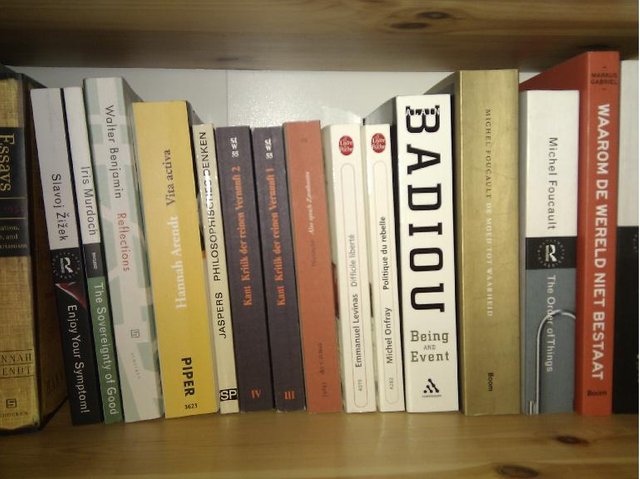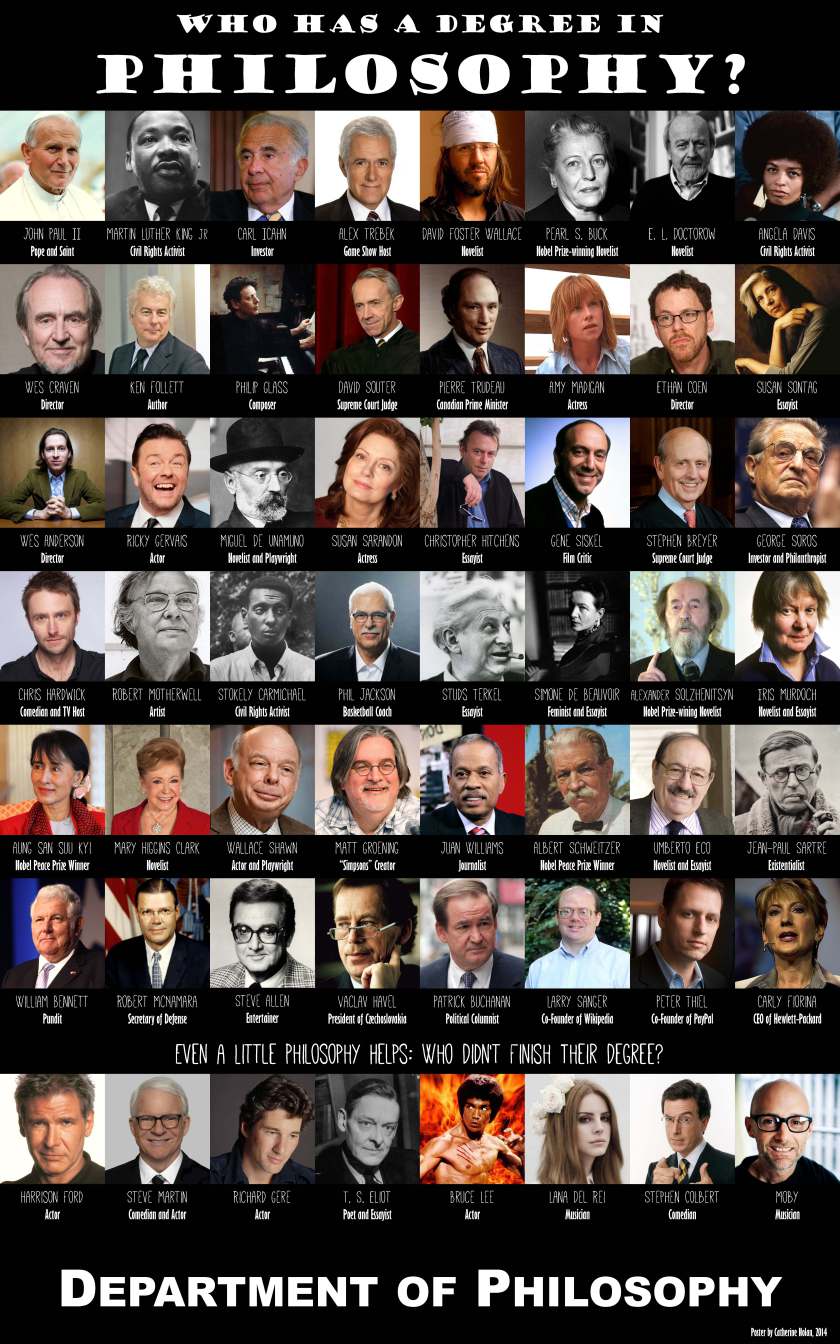Beyond the prejudice of philosophy - on why I am a (freelance) philosopher
I started to call myself a philosopher after finishing a master of philosophy at one of the Dutch universities,. I registered myself as a freelance philosopher in the Netherlands, a philosophical investigator or existential consultant, if you prefer. Or, in short: Brains for hire! Since then I finished a PhD in contemporary philosophy, and now I find myself working on very interesting projects all over the world, wherever some philosophical skill is necessary. And I also find myself at home, writing books for both the general public and books theoretical contemporary philosophers.
But I often find myself confronted with prejudices against philosophy, both in the world and the job market.

Philosophy? What? An area of expertise?!
Having recently decided to call myself a philosopher (yes I know, anyone can call them that, even those who studied philosophy but can only repeat what has been thought before, and don't think for themselves...), I hear it constantly: everybody is a philosopher! (Especially in a bar...) Why would you even consider studying philosophy? As if someone can think better if he has studied philosophy in the classic setting, with professors and students. But this way of thinking shows a couple of mistakes. (Maybe studying philosophy is useful to analyse them?)
Thinking is part of all areas of study. Just as philosophy forms an important part, maybe even the foundation of all areas of study. (All sciences were once part of philosophy, before they started to deal with the what-is instead of the why or what-could-be.) It's not strange that several universities acknowledge this and make philosophy mandatory for all students. To make sure that everyone at least once thought about the fact that what-is and what-could be is not a given, but a notion developed and still constructed.
Philosophy is more than thinking
But the subject area of philosophy is much more than thinking. Thinking is only a very small part of a philosophical act. Being able to see and understand a paradigm, on a more than abstract level, is not something one simply starts doing. Besides that being able to share a thought is important: to be part of any discourse, knowing which words to use and which level of understanding to take into account. Which is more than simply being able to write.
Not all questions are good questions. Asking questions is always a good thing, but a good question distinguishes itself through its Vernunft, its reasoning-power, the insight that is conveyed by the question. It castigates premises that are often implicit. These are not things you learn by reading a book, by listening to some online Ted-talks or by having (good) conversations in bars. It requires something more. Which is where a university comes in.
Or, this is where a university should offer skills and opportunities. Most often it does not, but then again, that one great teacher that makes you really rethink everything from the ground up is perhaps enough to make up for all those teachers who simply drill your lessons. I also notice it now I'm teaching myself - even if half the students have no clue what you're going on about, the other half (if you're lucky) gets something out of it they will never forget. And yes, I get complaints by administrators and students alike, but I teach because I want to shatter conceptions, not to make them get through life easily.
Job market? A philosopher isn't necessary, right?
And if you say you're working as a (freelance) philosopher, people look at you as if you're joking. Philosophy is seen as completely unusable. I completely disagree. Everyone has different talents and possibilities, and the different areas of study make it possible for people to find a field in which his or her own talents can be developed and put to good use. The fact that some people passively study philosophy and don't learn much from studying philosophy (or any other study) is not due to the field of study. Each education is only what you make of it yourself.
Besides, there has been quite some research done into philosophy majors and their earnings: "Surprise: Humanities Degrees Provide Great Return On Investment" (Philosophy is the top earner or all humanities!). And philosophers are indispensable in boardrooms, according to successful (public) philosopher Alain de Botton.
Studying philosophy gives a lot of tools and possibilities that distinguishes a philosopher from other graduates. That's why it's not such a weird thing they end up in special positions. Scenario-writer of the Big-Bang-Theory for instance.

Philosophy outside of academia?! Yes!
One of the conclusions in present-day discussions regarding the closing of that university faculty with which I might agree: it might not be so bad. But that doesn't mean I agree with the arguments given.
In order to develop Philosophy an academic structure is not necessary. A university probably isn't even the ideal place for philosophy: it is a scientific world which is concerned with numbers and publications. Philosophy is not a science, and real philosophical thoughts cannot just be published in an academic article to be re-published and re-structured in order to generate as much publications as possible. Academic philosophy cannot be sad to take the lead in developing thought.
Perhaps a philosophical faculty is not necessary at all universities, as long as philosophy can be pursued outside of the academy. Important to note is that philosophical education should remain (or become) available for all students (which seems to be the case in the Erasmus University example).
Distinction with public philosophy
The closing of philosophical faculties throughout the world is understandable in this time, in which philosophy can take place outside of the academy. Which is why it is important to (continue to) develop philosophy, and perhaps subsidizing this in academic institutions is not the best way to do so.
It is however important to distinguish between professional philosophy and 'public philosophy'. A distinction which is not a judgement, but a difference in development, goal and means. Philosophy books can become a repetition of all that is already thought on an underdeveloped level wherewith slogans form the main tone of argument. Which doesn't mean that such books can be useful and helpful for some.
Reading thinkers like Martin Heidegger or Maurice Blanchot, Bracha Ettinger, takes years: dedications, time and perseverance. And yes, those books are available everywhere in this age of information. But understanding them in this technological society in which everything needs to be fast, is not a small matter. To continuously push oneself to understand these thinkers, is not something everyone should occupy themselves with. For many and perhaps even for society it is even deemed useless. But that doesn't make it superfluous that some dedicate their lives to it, in order to give something to the world. Let's make sure that there will always be places where this can be done. Inside or outside the academic walls.
Wouldn't it be lovely if everyone would occupy themselves with that, doing something for the greater good. In one's own area of expertise, to make sure there are less (prejudicial) judgments about things people don't know anything about.
But, unfortunately not everyone can and/or wants to study philosophy.
[An earlier version of this article appeared on my blog, but is here updated to reflect my current position]
Great article? I just read your comment on my philosophy post to visit this one. Unfortunately, I am too late to upvote you. Anyways, keep up the good work.
@originalworks
The @OriginalWorks bot has determined this post by @nobyeni to be original material and upvoted it!
To call @OriginalWorks, simply reply to any post with @originalworks or !originalworks in your message!
What are the day-to-day activities of a freelance philosopher? Do you write and publisgh thoughts or is it more meeting with clients